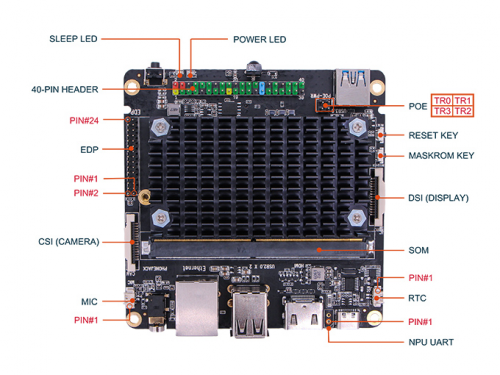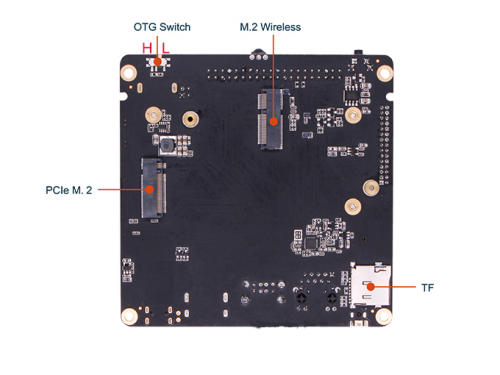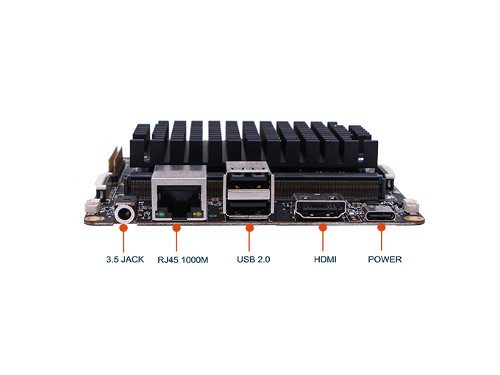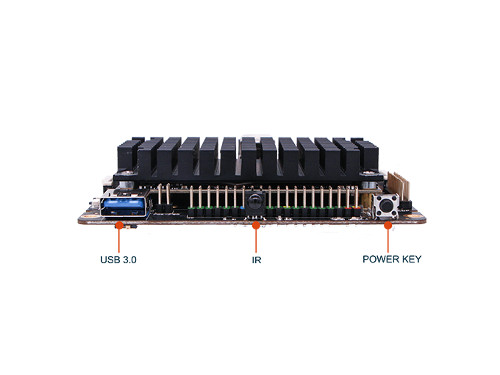Difference between revisions of "RockpiN10/hardware/rockpiN10"
(→General purpose input-output (GPIO) connector) |
|||
| Line 520: | Line 520: | ||
| +3.3V | | +3.3V | ||
|} | |} | ||
| − | |||
| − | |||
| − | |||
| − | |||
=== TF Card Interface === | === TF Card Interface === | ||
Revision as of 01:41, 9 April 2021
ROCK Pi N10 > Hardware > Main Board
This hardware user manual provides information about the features and signals available on ROCK Pi N10 board.
SOM
Features
| Model | ROCK PI N10 Model A | ROCK PI N10 Model B | ROCK PI N10 Model C |
|---|---|---|---|
| SoC CPU GPU NPU |
RK3399Pro Dual Cortex-A72, freqency 1.8Ghz with quad Cortex-A53, frequency 1.4Ghz Mali T860MP4, OpenGL ES 1.1 /2.0 /3.0 /3.1 /3.2, Vulkan 1.0, Open CL 1.1 1.2, DX11 | ||
| Memory | LPDDR3 4GB 64bit dual channel LPDDR3@1866Mb/s, 3GB for CPU/GPU, 1GB for NPU |
LPDDR3 6GB 64bit dual channel LPDDR3@1866Mb/s, 4GB for CPU/GPU, 2GB for NPU |
LPDDR3 8GB 64bit dual channel LPDDR3@1866Mb/s, 4GB for CPU/GPU, 4GB for NPU |
| Storage | on board high performance eMMC 16GB | on board high performance eMMC 32GB | on board high performance eMMC 64GB |
| Socket layout | Group CPU I2C : I2C1, I2C2, I2C4, I2C6, I2C8 | ||
| Size | - | ||
Contents
- 1 SOM
- 2 Audio: 3.5mm jack with MIC
- 3 Buttons
- 4 eDP Interface
- 5 Ethernet
- 6 HDMI
- 7 IR reveicer
- 8 LEDs
- 9 MIPI Camera Interface
- 10 MIPI Display Interface
- 11 M.2 Wireless
- 12 PCIE M.2 NGFF M-KEY SOCKET Interface
- 13 PoE
- 14 Power Supply
- 15 RTC
- 16 TF Card Interface
- 17 USB
- 18 General purpose input-output (GPIO) connector
Audio: 3.5mm jack with MIC
Audio can be played through speaker or headphones using a standard 3.5mm jack with MIC.
Note that HD codec supports up to 24-bit/96KHz audio.
Buttons
The ROCK Pi N10 board presents three buttons. They are Reset key, Maskrom key and Power key.
The Reset button serves as the hardware reset button. Short press and release the button, the system will be rebooted.
The Maskrom Button is for firmware flash/upgrade.
eDP Interface
eDP is the display interface. The definition table of the eDP connector is shown below.
As you can see, four lanes are layout.
| Pin# | Name | Pin# | Name |
|---|---|---|---|
| 1 | EDP_TX0P | 2 | EDP_TX0N |
| 3 | GND | 4 | GND |
| 5 | EDP_TX1P | 6 | EDP_TX1N |
| 7 | GND | 8 | GND |
| 9 | EDP_TX2P | 10 | EDP_TX2N |
| 11 | GND | 12 | GND |
| 13 | EDP_TX3P | 14 | EDP_TX3N |
| 15 | GND | 16 | GND |
| 17 | EDP_AUXP | 18 | EDP_AUXN |
| 19 | VDD | 20 | GND |
Ethernet
The Giga Bit Ethernet LAN with Power over Ethernet (PoE) is provided. If you are interested in POE (Power Over Ethernet), you should try it on the ROCK Pi N10 board. Additional HAT is required for powering from PoE.
Two LEDs are built into the RJ-45 LAN connector. This table describes the LED states when the board is powered up and the LAN subsystem is operating.
| LED | LED Color | Led State | Condition |
|---|---|---|---|
| Link | Green | Off On |
LAN link is not established. LAN link is established. |
| Data Rate | Yellow | Blinking Off |
There is activity on this port. No link is established. |
HDMI
The ROCK Pi N10 is equipped with one HDMI connector and one MIPI DSI. As for HDMI, the maximum resolution is 4k@60Hz. Any HDMI monitor should work as a display for the ROCK Pi N10. As for MIPI DSI, it is designed for raw LCD pannel. HDMI and MIPI DSI can work at the same time.
HDMI port supports Consumer Electronics Control (CEC) function. Using ROCK Pi N10 connected to a TV that supports CEC, you can use the command line cec-client application to control the inputs and the TV itself.
The HDMI interface pin specification shows below.
| Pin# | Name |
|---|---|
| 1 | HDMI_TX2P |
| 2 | GND |
| 3 | HDMI_TX2N |
| 4 | HDMI_TX1P |
| 5 | GND |
| 6 | HDMI_TX1N |
| 7 | HDMI_TX0P |
| 8 | GND |
| 9 | HDMI_TX0N |
| 10 | HDMI_TXCP |
| 11 | GND |
| 12 | HDMI_TXCN |
| 13 | HDMI_CEC |
| 14 | NC |
| 15 | DDC_SCL |
| 16 | DDC_SDA |
| 17 | GND |
| 18 | VCC5V0_HDMI |
| 19 | PORT_HPD |
IR reveicer
IRM-3638 module is equipped. its carrier frequency is 38 KHz. And the date rate is high, up to 4000 bit/sec.
LEDs
Red LED: Power LED, also the Red LED, could be control by GPIO1_A1. The LED is ON when the GPIO1_A1 is HIGH. The LED is OFF when the GPIO is LOW.
Green Led: Reset LED.
MIPI Camera Interface
There is a wide range of camera applications in our lives. MIPI CSI 2 lane on board support 800 MP camera via FPC connector.
The MIPI CSI interface pin specification shows below.
| Pin# | Name |
|---|---|
| 1 | VCC_CAM |
| 2 | I2C4_SDA |
| 3 | I2C4_SCL |
| 4 | CAM_MCLK |
| 5 | CAM_GPIO1 |
| 6 | GND |
| 7 | MIPI_RX0_CLKP |
| 8 | MIPI_RX0_CLKN |
| 9 | GND |
| 10 | MIPI_RX0_D1P |
| 11 | MIPI_RX0_D1N |
| 12 | GND |
| 13 | MIPI_RX0_D0P |
| 14 | MIPI_RX0_D0P |
MIPI Display Interface
The ROCK Pi N10 is equipped with one HDMI connector and one MIPI DSI. As for HDMI, the maximum resolution is 4k@60Hz. Any HDMI monitor should work as a display for the ROCK Pi N10. As for MIPI DSI, it is designed for raw LCD pannel. HDMI and MIPI DSI can work at the same time.
The MIPI DSI interface pin specification shows below.
| Pin# | Name |
|---|---|
| 1 | VCC_MIPI |
| 2 | VCC_MIPI |
| 3 | GND |
| 4 | I2C_SDA_AUDIO |
| 5 | I2C_SCL_AUDIO |
| 6 | GND |
| 7 | MIPI_TX/RX_D0P |
| 8 | MIPI_TX_RX_D0N |
| 9 | GND |
| 10 | MIPI_TX/RX_CLKP |
| 11 | MIPI_TX_RX_CLKN |
| 12 | GND |
| 13 | MIPI_TX/RX_D1P |
| 14 | MIPI_TX/RX_D1N |
| 15 | GND |
M.2 Wireless
This the M.2 Wireless Socket pin definition table.
| Name | Pin# | Pin# | Name | |
|---|---|---|---|---|
| GND | 1 | 2 | +3.3V | |
| NV | 3 | 4 | +3.3V | |
| NV | 5 | 6 | GPIO_LED | |
| GND | 7 | 8 | NC | |
| SDIO_CLK | 9 | 10 | NC | |
| SDIO_CMD | 11 | 12 | NC | |
| SDIO_D0 | 13 | 14 | NC | |
| SDIO_D1 | 15 | 16 | NC | |
| SDIO_D2 | 17 | 18 | GND | |
| SDIO_D3 | 19 | 20 | BT_HOST | |
| WIFI_HOST_WAKE | 21 | 22 | UART0_RXD | |
| WIFI_REG_ON | 23 | |||
| GND | 33 | 32 | UART0_TXD | |
| NC | 35 | 34 | UART0_CTS | |
| NC | 37 | 36 | UART0_RTS | |
| GND | 39 | 38 | NC | |
| NC | 41 | 40 | NC | |
| NC | 43 | 42 | BT_REG_NO | |
| GND | 45 | 44 | NC | |
| NC | 47 | 46 | NC | |
| NC | 49 | 48 | NC | |
| GND | 51 | 50 | RTC_CLKO | |
| NC | 53 | 52 | NC | |
| NC | 55 | 54 | NC | |
| GND | 57 | 56 | NC | |
| NC | 59 | 58 | I2C_DATA | |
| NC | 61 | 60 | I2C_CLK | |
| GND | 63 | 62 | NC | |
| NC | 65 | 64 | NC | |
| NC | 67 | 66 | NC | |
| GND | 69 | 68 | NC | |
| NC | 71 | 70 | BT_WAKE | |
| NC | 73 | 72 | 3.3V | |
| GND | 75 | 74 | 3.3V |
PCIE M.2 NGFF M-KEY SOCKET Interface
On ROCK Pi N10, M.2 connector supports up to 2T M2 NVME SSD.
The PCIE M.2 interface pin specification shows below.
| Name | Pin# | Pin# | Name | |
|---|---|---|---|---|
| GND | 1 | 2 | +3.3V | |
| GND | 3 | 4 | +3.3V | |
| PERn3 | 5 | 6 | NC | |
| PERp3 | 7 | 8 | NC | |
| GND | 9 | 10 | DAS/DSS# | |
| PETn3 | 11 | 12 | +3.3V | |
| PETp3 | 13 | 14 | +3.3V | |
| GND | 15 | 16 | +3.3V | |
| PERn2 | 17 | 18 | +3.3V | |
| PERp2 | 19 | 20 | NC | |
| GND | 21 | 22 | NC | |
| PETn2 | 23 | 24 | NC | |
| PETp2 | 25 | 26 | NC | |
| GND | 27 | 28 | NC | |
| PERn1 | 29 | 30 | NC | |
| PERp1 | 31 | 32 | NC | |
| GND | 33 | 34 | NC | |
| PETn1 | 35 | 36 | NC | |
| PETp1 | 37 | 38 | DEVSLP | |
| GND | 39 | 40 | NC | |
| PERn0/SATA-B+ | 41 | 42 | NC | |
| PERp0/SATA-B- | 43 | 44 | NC | |
| GND | 45 | 46 | NC | |
| PETn0/SATA-A- | 47 | 48 | NC | |
| PETp0/SATA-A+ | 49 | 50 | PERST# | |
| GND | 51 | 52 | CLKREQ# | |
| REFCLKN | 53 | 54 | PEWake# | |
| REFCLKP | 55 | 56 | NC | |
| GND | 57 | 58 | NC | |
| NC | 67 | 68 | SUSCLK | |
| PEDET | 69 | 70 | +3.3V | |
| GND | 71 | 72 | +3.3V | |
| GND | 73 | 74 | +3.3V | |
| GND | 75 |
PoE
PoE connector is divided into two groups, Group A and Group B.
- Group A: TR0 and TR1
- Group B: TR2 and TR3
PoE connector shows below.
| Name | Name |
|---|---|
| TR1 | TR0 |
| TR2 | TR3 |
Power Supply
The ROCK Pi N10 is powered by Type-C port and has a wide range of input voltage, from 9V to 21V. The ROCK Pi N10 supports USB Type-C PD 2.0 with 9V/2A, 12V/2A, 15V/2A and 20V/2A. Besides, the Pi supports QC 3.0/2.0 with 9V/2A and 12V/1.5A. The Type-C cable you using needs to support data communication. We call it USB Type-C charging data cable.
RTC
The RTC connector is designed according to the standard connector type.
| Pin# | Name |
|---|---|
| 1 | GND |
| 2 | +3.3V |
TF Card Interface
The TF card can be used as a system storage or an external storage. When it's used as a system storage, you had better choose the ones with storage space larger than 8GB. When it's used as an external storage, you can choose the ones with storage space up to 128GB. When the TF card is inserted into the TF card slot , the device will be automatically recognized by the system.
The TF card interface pin specification shows below.
| Pin# | Name |
|---|---|
| 1 | SDMMC0_D2 |
| 2 | SDMMC0_D3 |
| 3 | SDMMC0_CMD |
| 4 | VCC3V3_SYS |
| 5 | SDMMC0_CLK |
| 6 | GND |
| 7 | SDMMC0_D0 |
| 8 | SDMMC0_D1 |
| 9 | SDMMC0_DET_L |
| 10 | GND |
| 11 | GND |
| 12 | GND |
| 13 | GND |
USB
Double Type-A USB 2.0 host port
This port enables the attachment of peripherals such U Disk, keyboards, mice, USB dongle etc.
Type-A USB 3.0 port with OTG Switch
When the USB OTG Switch is switched to the host side, the Type-A USB 3.0 port also enables the attachment of peripherals such U Disk, keyboards, mice, USB dongle etc.
The OTG Switch, shown on the second picture from the top of this page:
- Left side: Host side
- Right side: Device side
Compared with USB 2.0 host port, this USB 3.0 port supports On-The-Go(OTG) when the USB OTG Switch is switched to the device side. Thus the Soc is recognized as an device.
Take adb as an example. You can use a Type-A to Type-A cable as a bridge between you PC and ROCK Pi N10 Board. In addition to the system configuration, you can setup the adb tool on your PC to access ROCK Pi N10 over adb.
General purpose input-output (GPIO) connector
ROCK Pi S has two 26-pin expansion header. Each pin is distinguished by color.
For more details, see the GPIO page.




